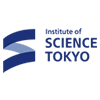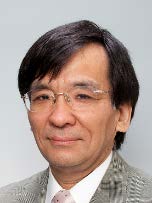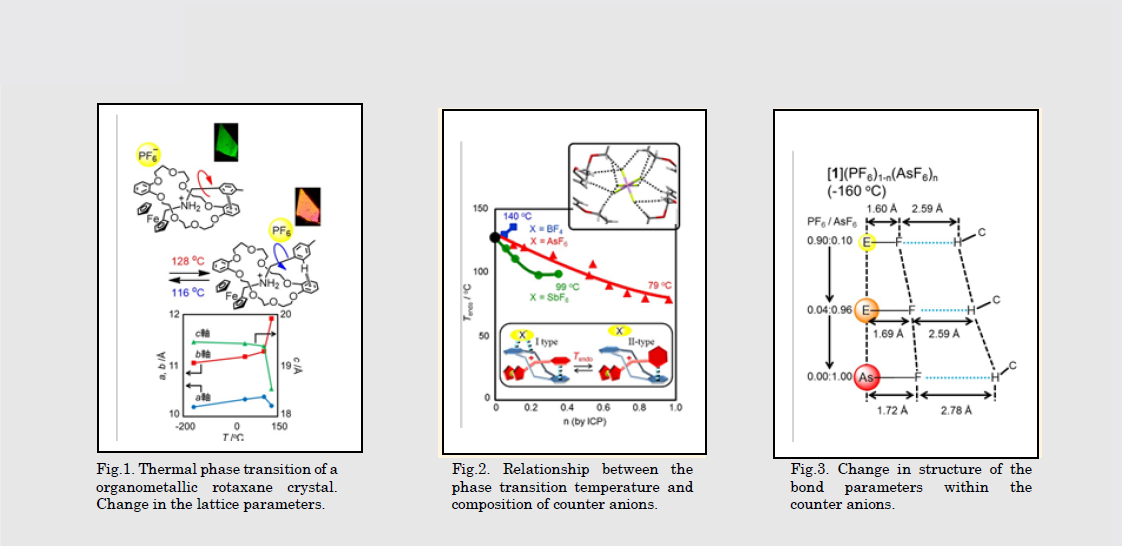
CLS
Laboratory for Chemistry and Life Science, Institute of Integrated Research, Institute of Science Tokyo
東京科学大学
総合研究院
化学生命科学研究所

LAST UPDATE 2017/02/25
-
研究者氏名
Researcher Name小坂田耕太郎 Kohtaro OSAKADA
教授 Professor -
所属
Affiliation東京科学大学 総合研究院 化学生命科学研究所
物質・デバイス領域共同研究拠点
Laboratory for Chemistry and Life Science, Institute of Integrated Research, Institute of Science Tokyo
Network Joint Research Center for Materials and Devices -
研究キーワード
Research Keywords結晶相転移
超分子
有機金属
構造色
Crystalline phase transition
Supramolecules
Organometallics
Structural colors
- 研究テーマ
Research Subject -
ロタキサン結晶相転移を用いる光スイッチング素子の開発
Photo-switching crystals of rotaxane based on the crystalline phase transition.
研究の背景 Background of the Research
環状分子と軸状分子とがインターロックしたロタキサンは二成分分子が独立して運動することから、特性に興味をもたれているが、その固体状態での構造変化やこれに基づく機能については研究例がほとんどなかった。本研究では有機金属ロタキサンの結晶相転移による構造色変化、相転移温度の制御、相転移機構の解明などを実験、理論計算の両方から行う。
Rotaxanes that are composed of macrocyclic and axle molecules are one of the representative supramolecules. Motion of the two component molecules are independent, although it is within the interlocked framework. Studies on dynamic behavior of the rotaxanes in the solid state are important, but have been rare. This study aims obtain the rotaxanes which causes crystalline phase transition as well as accompanying change of the structural colors, regulation of the temperature range of the phase transition, as well as detailed mechanism of the rotaxane motion in the solid state and the crystalline phase transition.
研究の目標 Research Objective
有機金属基であるフェロセンを末端に有する軸分子とクラウンエーテルとから成るロタキサンの単結晶を研究対象とし、室温―80℃程度の範囲に相転移温度を有し、低温相と高温相で異なる光学的性質が異なる結晶ロタキサンを開発している。これまでロタキサンの対アニオンを変化させ、組成を変えることによって相転移温度を制御すること、相転移による結晶の構造色変化の観察に成功してきた。本研究の目的は光を駆動力とする相転移とこれによる光学機能変化を起こすロタキサン結晶を開発することにあり、パルス刺激による構造、機能制御をめざす。
Ferrocene, an organometallic group, is chosen as the axle component of the rotaxane crystal in this study. The rotaxane which shows the phase transition in the range of room temperature and 80 ℃ was obtained, and its phase transition temperature is regulated by choosing the counter anions and their composition. This study aims the rotaxane crystals whose phase transition is induced by photo-irradiation, which would enable the phase transition and change of the optical properties of the crystals by pulse stimulus.
研究図Figures

論文発表 / Publications
Chem. Lett. 43. 935 (2014); Chem. Eur. J. 20, 4762 (2014); Dalton Trans. 42, 16222 (2013); J. Am. Chem. Soc., 134, 17392 (2012); Chem. Commun., 48, 278 (2012); J. Mater. Chem., 21, 931 (2011).
研究者連絡先 / HP
- kosakada
 res.titech.ac.jp
res.titech.ac.jp - http://www.res.titech.ac.jp/~shinkin/